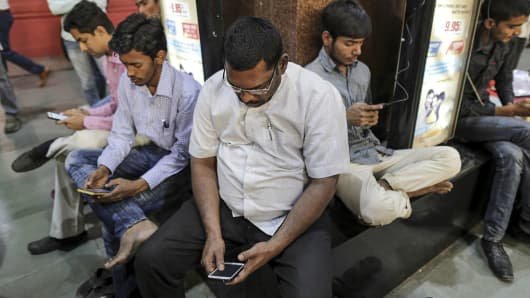
I recently read an article written by a very solid tech author named Anita Balakrishnan who has a lot of experience on the subject matter presented due to the fact that as she described it, she has 'an Indian background.' The article was titled 'India reveals 6 truths about the future of tech that would surprise many Americans' and it made some interesting points that I'd like to share with my readers.
Rarely do I spend time writing about technology trends in India or China but in reality these are two of the most deserving markets to talk about because of their huge populations. In business you want to leave no stone unturned and no market untapped. So in this article I will present some of Anita Balakrishnan's views on how technology will be adopted and changed to meet India's needs.
1. The Apple Brand and What to Expect from India.
As expected, Indian street vendors in the garment district were flush with knock-offs of Western brands like Addidas and Puma — and ready to haggle. But I also saw some "luxury" clothing that you'd never see in the States: Clothing plastered with the Apple logo.
While U.S. consumers now have flagships from Samsung and Google that rival the iPhone, Apple's brand power is still very strong in the rest of the world — the Microsoft logo just doesn't have the same fashion appeal, I'm afraid.
Although India's per capita income hardly justifies shelling out $999 on a phone, the iPhone X is not far from people's minds (it helps that iPhone X billboards are all over Mumbai.) While Chinese brands like Oppo and Vivo were prevalent, I saw many a flagship phone in the same streets as cows and camels.
In short, the iPhone is still an aspirational product for much of the world, so don't count Apple out yet.
I have to admit, I find this a bit funny that people are walking around wearing Apple branded shirts as if they were handmade Italian suits or designer Prada handbags but if it brings you a bit of attention in India, so be it!
2. Autonomous Vehicles Will Need Major Modifications!
Traffic in San Francisco or Pittsburgh might be relatively bustling by U.S. standards. But it's nothing compared to riding in an Indian autorickshaw. In countries where traffic rules are more fluid, autonomous vehicles may need to start the artificial intelligence process in from a fundamentally different point of view.
In the U.S., it's possible to train a car to learn the rules of the road, and then refine the technology around rare "edge cases." A car driving in India, on the other hand, might need to be reactive first and learn to say, read the eye contact of a motorcyclist to see where he intends to go, or track the distance of honking horns and warnings like flashes of floodlights.
This makes a lot of sense to me. I would imagine the types of obstacles and the rules of the road would make programming a driverless car in the United States a lot easier than programming one to deal with the obstacles of modern day India. Because the developing world is a lot more crowded and traffic laws don't always see enforcement, it makes for a lot of unexpected situations that will be incredibly hard to train AI powered driverless cars to navigate. But, there is no doubt in my mind that it can be and will be done!
3. If the West Doesn't Improve it's Infrastructure, the Developing World Will Leapfrog it!
Magarpatta City, a township within the metropolitan area of Pune, more closely resembles something out of a sci-fi movie than a post-colonial Asian city. It's a smart "cyber city" that leaves no detail unplanned, from safety for schoolchildren to irrigation of tree roots. The water treatment, energy consumption, schooling and shopping is all self-sustaining.
While North American cities like Toronto are experimenting with "smart" infrastructure, what I saw in Magarpatta City could only be built from the ground up. Most Western cities are comfortable, by in large, with the existing infrastructure — the challenges that have forced India to change, like exploding population growth and pollution, don't push on the West as hard.
But the pressing need for change in Asia, as well as the willingness to demolish old infrastructure, could present an opportunity for India to take advantage of new technologies like hyperloop in a way that the New York Subway system never could.
Smart cities are already being built in Asia but I doubt there is anything more than a prototype of a smart city in the USA at the moment. There is a debate to be had about whether we really need 'smart cities' but that it beside the point! Traditional the first world has been a few steps ahead of the developing world and that may change in regard to technology in the coming years and decades.

Techblogger Wrap Up
I learned quite a few things from this article that I was happy to share with my readers. Firstly the fact that people are paying top dollar for Apple branded shirts and walking around effectively using them as a status symbol of wealth was a new insight into how powerful Apple still is in India. Don't count them out yet, obviously the iPhone is still the top dog there!
The understanding that technology like autonomous cars may be cool and high-tech but it will need a lot of work to get it ready to navigate third world and developing world driving scenerios.
Finally, the author made the point that the West has really fallen behind in terms of building infrastructure... Why is that? Don't they see that infrastructure is a crucial component of society and that it is worth every dollar of investment they can muster?
I hope you enjoyed reading this. Please leave your thoughts and comments below!
Thanks for dropping by @techblogger
Source:
India reveals 6 truths about the future of tech that would surprise many Americans - CNBC
Image Source:
www.cnbc.com
I liked the article, the future behind intelligent technologies, whether indium and china, with their huge population. Brands such as Apple exist only because of good and aggressive advertising, it's like a Mercedes - it's considered pristizhno. But many people will prefer a cheaper and not less quality product.
one way or another, the whole world is moving towards progress, simply in some countries because of corruption and bankruptcy of power, society is progressing little. Thank you
Some really thought provoking concepts there @techblogger. I especially resonated with the rethink of autonomous vehicle design. What a challenging field when a set of rules isn't the foundation of how a system "functions".
thanks for share great information @techblogger
Great information...
Truly technology is sweeping over and it can't stop anymore. Indian is never an exception. It continues worldwide. This is so informative @techblogger
It's true. Technology is one of the most important markets out there, great post @techblogge
nice
the future of tech lies in our imagination as literally everything is possible
Great Article...! here i try to write article about ### Latest Gadgets
Let me know if you like it.